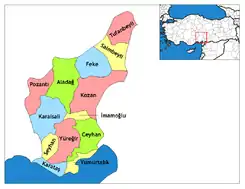Karataş
Karataş (Greek: Μέγαρσος, Mègarsos) is a municipality and district of Adana Province, Turkey.[2] Its area is 862 km2,[3] and its population is 23,499 (2022).[1] The town itself has 10,293 inhabitants.[4] It is on the Mediterranean coast of Turkey, 47 km from the city of Adana, between the rivers Seyhan and Ceyhan, the Pyramos of Antiquity.
Karataş | |
|---|---|
District and municipality | |
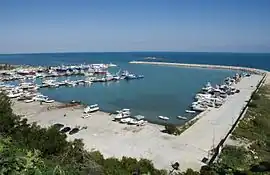 | |
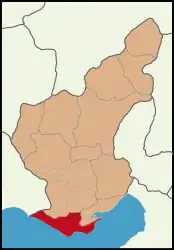 Map showing Karataş District in Adana Province | |
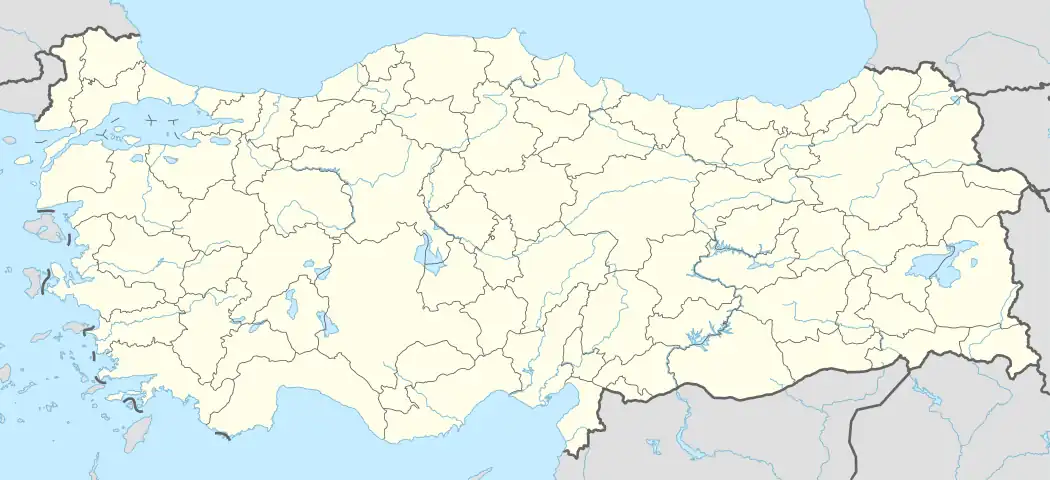 Karataş Location in Turkey | |
| Coordinates: 36°33′45″N 35°22′49″E | |
| Country | Turkey |
| Province | Adana |
| Government | |
| • Mayor | Necip Topuz (MHP) |
| Area | 862 km2 (333 sq mi) |
| Elevation | 10 m (30 ft) |
| Population (2022)[1] | 23,499 |
| • Density | 27/km2 (71/sq mi) |
| Time zone | TRT (UTC+3) |
| Postal code | 01900 |
| Area code | 0322 |
| Website | www |
History
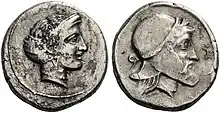
The area has been inhabited from at least Hittite times and probably earlier. It was later part of the Assyrian province of Quwê (Que). By the time of the Greeks, who knew the city as Megarsos/Magarso, there was a port here at the mouth of the navigable Pyramos, supplying an important military and trading route into the plain of Cilicia, and also providing access to the sea for the river towns, like Mallus. In 333 BCE, just before the battle of Issus, Alexander the Great sacrificed here at a temple that, by interpretatio graeca, he took to be of Athena; the "Athena of Magarsos" who appears on Hellenistic coins has been diagnosed, from her pose and the attributes that surround her, to have Mesopotamian connections.[5] Robin Lane Fox[6] recognizes the origin of the cult site in the victories of Sennacherib, who instituted the shrine in 696 BCE following a sea battle with Greeks off the mouth of the river;[7] he dedicated it to his martial goddess, Anat, or Ishtar.
The Romans rendered Magarsos as Megarsus. The port was later conquered by the Arab armies during the growth of Islam and then by the Ottomans in 1517.
Karataş was occupied by French troops during World War I.
Composition
There are 43 neighbourhoods in Karataş District:[8]
- Adalı
- Ataköy
- Bahçe
- Bebeli
- Çağşırlı
- Çakırören
- Çavuşlu
- Çimeli
- Çukurkamış
- Damlapınar
- Develiören
- Dolaplı
- Gölyaka
- Hacıhasan
- Hasırağacı
- Helvacı
- İnnaplıhüyüğü
- İsahacılı
- Kapı
- Karagöçer
- Karataş
- Karşıyaka
- Kemaliye
- Kesik
- Kiremitli
- Kırhasan
- Kızıltahta
- Konaklı
- Meletmez
- Orta
- Oymaklı
- Sarımsaklı
- Sirkenli
- Tabaklar
- Terliksiz
- Topraklı
- Tuzkuyusu
- Tuzla
- Yassıören
- Yemişli
- Yeni
- Yenimurat
- Yüzbaşı
Places of interest
- The ruins of churches, caravanserai, and an amphitheatre. However the ancient monuments remain to date in lack of proper research or preservation.
- The inlet of Akyatan is a breeding ground for many birds and the sea turtle species Chelonia mydas and Caretta caretta. Karataş is particularly important for the latter, which is an endangered species that lays eggs primarily in Akyatan, another beach in neighboring Yumurtalık district and İztuzu Beach in Dalyan in southwestern Turkey.
Karataş today
Today Karataş is known for its fishing industry and as a place that Adana's inhabitants can easily access to relax on the beach. There are also rich farmlands behind the coast where cotton, watermelons, melons and other crops are grown.
The well-known footballer Hasan Şaş is from Karataş and has a street named after him in memory of his excellent performance for Turkey national football team during the 2002 World Cup.
Brussels-based painter Nazife Can is also from Karataş.
References
- "Address-based population registration system (ADNKS) results dated 31 December 2022, Favorite Reports" (XLS). TÜİK. Retrieved 12 July 2023.
- Büyükşehir İlçe Belediyesi, Turkey Civil Administration Departments Inventory. Retrieved 12 July 2023.
- "İl ve İlçe Yüz ölçümleri". General Directorate of Mapping. Retrieved 12 July 2023.
- "Karataş". citypopulation.de. Retrieved 17 July 2023.
- Arthur Houghton, "The Seleucid mint of Mallus and the cult figure of Athena Magarsia", inA, Houghton, S. Hester et al. (eds.) Festschrift für /Studies in Honour of Leo Miildenburg1984 :99-110. 1984:99-110, noted by Fox 2008.
- Fox, Travelling Heroes in the Epic Age of Homer, 2008:82f.
- The monument to his land victory, Robin Lane Fox observes, was at Anchiale,
- Mahalle, Turkey Civil Administration Departments Inventory. Retrieved 12 July 2023.
External links
- District governorate's official website (in Turkish)
